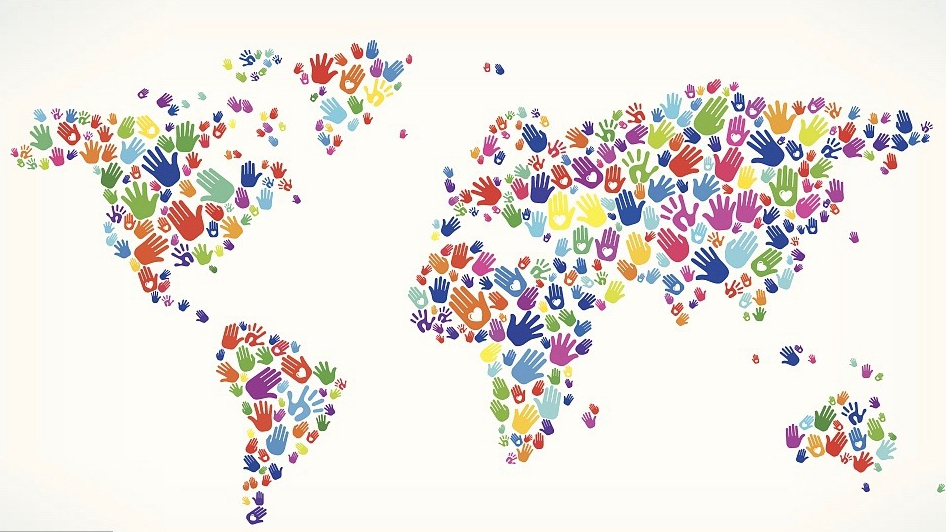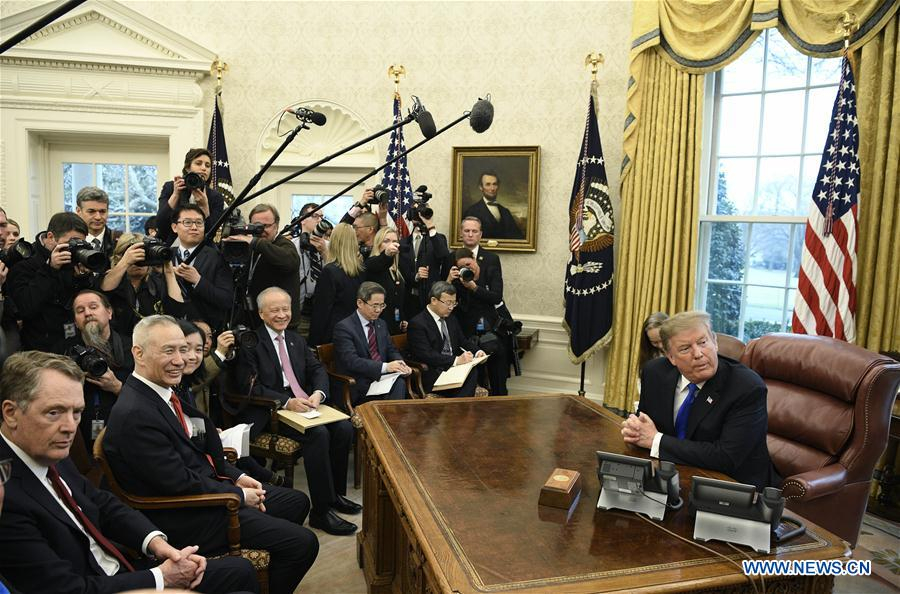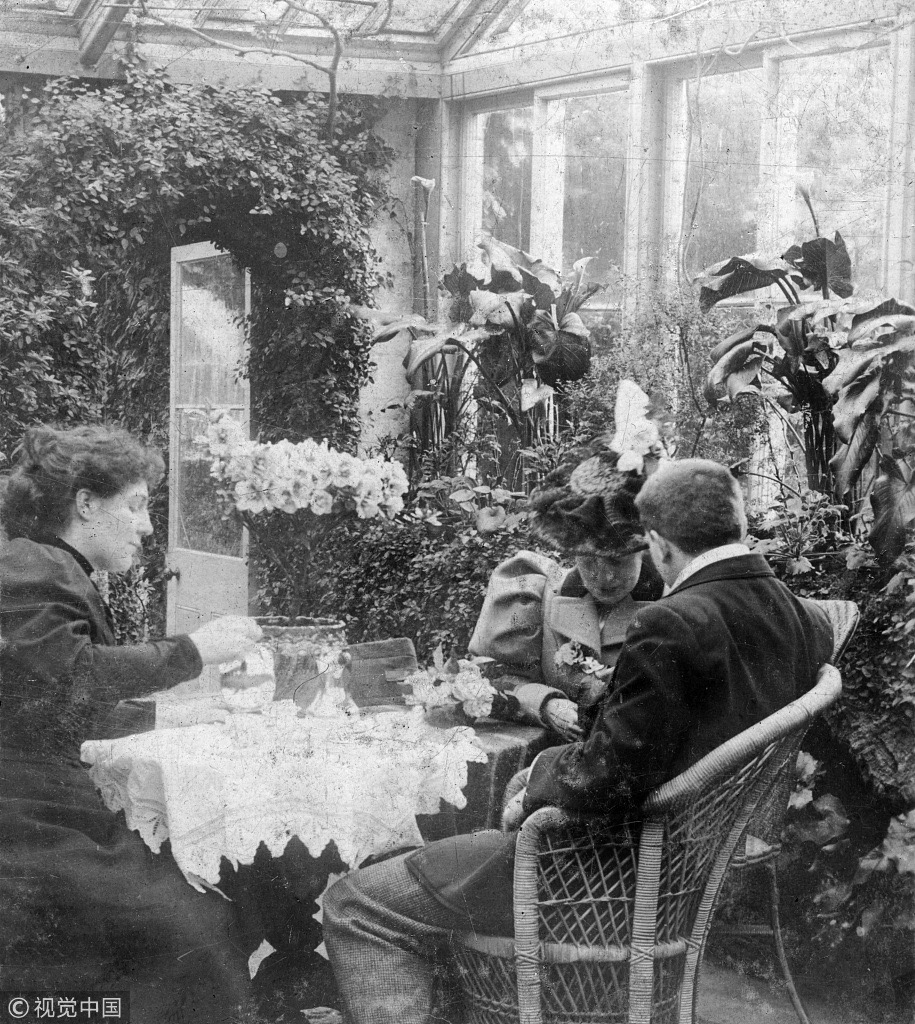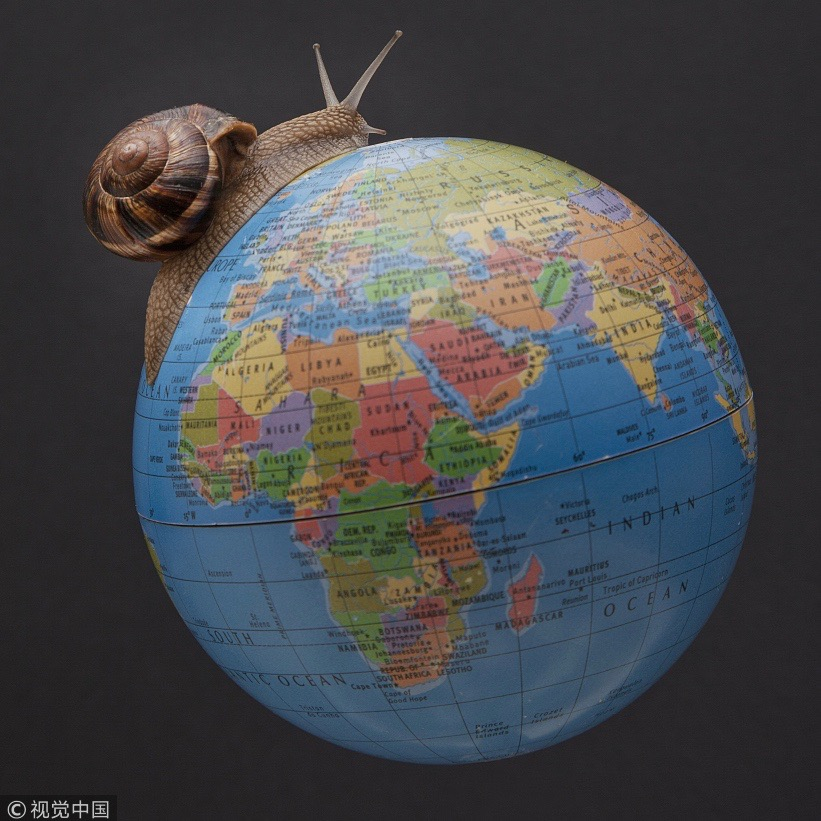
Analysis
15:54, 23-Feb-2019
What's in store: Globalization, parochialism, or somewhere in between?
Updated
16:57, 23-Feb-2019
By Wang Xiaonan

The seventh round of the China-U.S. trade talks continues to suck up the oxygen in Washington after it was extended by two days. U.S. President Donald Trump expressed optimism in striking a deal with China and said he is looking forward to meeting his Chinese counterpart Xi Jinping again in the near future.
But "major hurdles" remain before a final agreement can be signed, warned U.S. Trade Representative Robert Lighthizer, who co-led the talks together with the milder Treasury Secretary Steven Mnuchin.
Though the strain on global businesses due to China-U.S. trade tensions are easing, the conflict between the world's largest two economies is a manifestation of the modern world tearing itself apart between globalism and parochialism.

U.S. President Donald Trump (1st R) meets with Chinese Vice Premier Liu He (2nd L, front) at the Oval Office of the White House in Washington, DC, February 22, 2019. /Xinhua Photo
U.S. President Donald Trump (1st R) meets with Chinese Vice Premier Liu He (2nd L, front) at the Oval Office of the White House in Washington, DC, February 22, 2019. /Xinhua Photo
The globalization episode isn't over yet.
One of the future scenarios for the world economy is continuing the momentum of globalization. Since Europeans made contact with the New World in the late 15th century, tales of coffee migrating from Ethiopia to Europe, humble potatoes traveling from Peru and Bolivia to everyone's plate and Chinese tea sailing across oceans to make possible afternoon tea breaks have defined the historical narrative of more than two centuries.
The world was humming, greatly expedited by the Industrial Revolution in Great Britain. Between the 1760s and the 1840s, the steam engine allowed for human productivity at an unprecedented scale, precipitating a heavy industry-oriented urbanized society while buoying land-powered economies with locomotives, steam carriages and boats.
Fast forward to the 1900s, in which two world wars handed over Europe's global economic crown to the United States, where computers and the Internet created a prosperous era fueled by information. In the 1990s and the early 2000s, "a computer on every desk and in every home," as Bill Gates once pledged when he founded Microsoft, has changed the way we work, live and communicate.
In a globalized world, companies no longer source and make their products in one country. Intel manufactures its microprocessors and chips in not only four U.S. states but also in China, Ireland and Israel, and then the products are assembled in Malaysia, Vietnam, China and even Costa Rica. Apple's iconic MacBook has been using Intel chips for over a decade.
Globalization mobilizes resources in every corner of the world, gives rise to competitiveness among corporations, and lowers consumer prices while creating more jobs. Through infusions of global capital, technology and labor, it lifted boats in both poor and rich countries.

People are having afternoon tea in Britain, in the late 19th century. /VCG Photo
People are having afternoon tea in Britain, in the late 19th century. /VCG Photo
"Shunning out the sun"
In the 1840s, French classical-liberal economist Frédéric Bastiat wrote a satirical letter titled "The Candle Maker's Petition" to the French parliament. The petition, in which he imitated the tone of local lighting manufacturers, gripes about competition from a rival who overtook their market with rock bottom prices. The culprit? The sun. The lighting industry in the letter calls on the government to formulate a law to close all windows, curtains, and holes that let in sunlight in order to save local candle factories and make the French rich.
The "shunning the sun" theory never lost its shine. This is shown in government taxation throughout modern history – from the British tariff protection of cotton between 1774 and 1820 to the German Tariff Agreement of 1879 to the Smoot-Hawley Tariff Act signed into law in 1930 amid the Great Depression.
The little skirmishes between globalization and protectionism dominated the world economy for centuries until the China-U.S. trade war broke out. The almost year-long conflict interrupted global business and upset the existing international order, in favor of narrow regional interests.
Across the pond, populist movements have been all the rage – from the long-haul Brexit to the "yellow vest" protests across France to Italy's new populist government. Given the surge of parochialism in the Western world, Samuel Huntington might not be off the mark when he theorized that different cultures will "re-indigenize" as they come into greater contact with each other. When the economy falters and inequality grows amid massive globalization, people tend to shun global society and coalesce along civilizational lines.

A snail on a tellurion /VCG Photo
A snail on a tellurion /VCG Photo
There's likely to be something in between: Slowbalization.
At the very onset of the Industry 4.0 era, the vision of globalization seems at risk of derailing more than ever now that its looming cons are threatening to outweigh all the prosperities it has brought. It poured wealth to a few top multinational consortiums, hastened a de-manufacturing process in some developed countries, and caused real wage stagnation for a bulk of blue-collar workers.
While the world seems to be ripping apart between globalization and parochialism, we might arrive at somewhere in between. In its latest issue, The Economist adopted the word "Slowbalization" to describe the years ahead. Dutch trend-watcher Adjiedj Bakas coined the jargon, referring to the current trend where "globalization is losing pace."
According to The Economist, the global value of cross-border investment by multinationals sank by some 20 percent in 2018. "One reason is the change in global economic structure by shifting toward services, which is harder to sell across borders," Wang Dan, China analyst of the Economist Intelligence Unit, told CGTN.
The golden era of globalization – dominated by fast logistics of goods – has almost gone. Meanwhile, inequality, along with political and generational divides, is deepening, partly driven by rapid globalization over the past decades, Wang added. She noted that "with conservative political powers rising all over the world, policies will turn inward."
But whether this new era of sluggish globalization will grind to a halt largely depends on the leading economic players.

SITEMAP
Copyright © 2018 CGTN. Beijing ICP prepared NO.16065310-3
Copyright © 2018 CGTN. Beijing ICP prepared NO.16065310-3